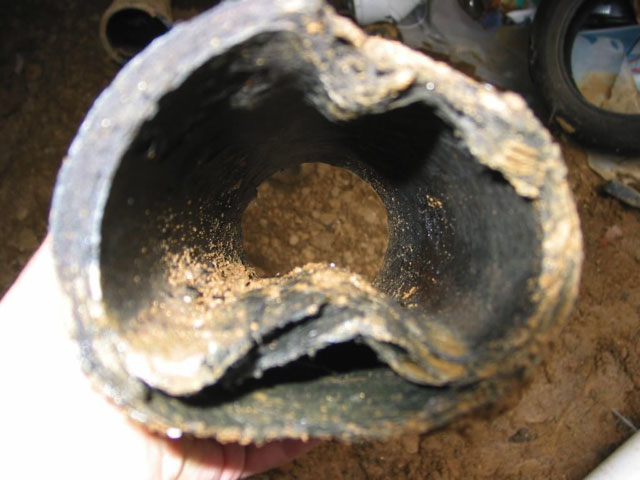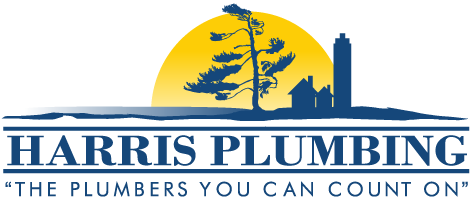We know what you’re thinking – “that doesn’t sound good at all.” And you’re right – it isn’t. In this article, our intent is not to scare you, but to make you aware of the very real home plumbing pipe risks that may haunt you from under your home.
Haven’t heard of Orangeburg or ‘No-Corrode’ pipe? We’ve got you covered:
Following World War II, Canadian plumbers began installing sewer pipes made out of wood pulp and pitch. We’re not joking – many of the pipes installed in Canada between 1945 and 1980 are made out of vulnerable cardboard-like materials.
That can’t be right, why would plumbers do that?
Well, following the war, the demand for cheap housing materials was at an all-time high. This pressure caused manufacturing companies to look for ways to capitalize on material scarceness and develop a product that would meet the financial needs of builders in Canada.
What is Orangeburg pipe?
The term ‘Orangeburg’ refers to the brand name of the sewer pipe made by Orangeburg Manufacturing Co., Inc. of Orangeburg, New York. However, the technical term for this type of pipe is bituminous fibre pipe, and others call it “black pipe”.
Bituminous fibre pipes are made from asbestos and cellulose (wood) fibres that are impregnated with a coal tar (bituminous) compound and feature a multi-ply wall.
While these pipes were designed to withstand 50 years, many have failed in just 30.
“For being a coal tar impregnated toilet paper tube, it hasn’t done half bad,”
Jon Schladweiler
What does that mean for Canadians?
Unfortunately, this low-cost product was designed with little regard for the future. In fact, most plumbers will tell you that it’s a miracle that no-corrode pipes have lasted as long as they have. However, when it comes to pipes that haven’t stood the test of time, Canadian’s have faced devastating costs and damage due to flooding.
“Black water started coming up from the drain in our basement floor. We were told we had Orangeburg piping and the tree roots in our yard were crushing it. At this point, we have spent over $20,000 in sewer line repairs and the replacement of carpet and furniture.”
Erika Dronen to The Patch
What happens to No-Corrode pipe over time?
Orangeburg pipes started to fail in the 1990s. As reported by many resources, the pipes began to flatten into ovals, and the walls became saggy and susceptible to tree root invasion – forcing holes and creating blockages. This problem caused thousands of bathroom toilets to begin flushing into sinks, beginning the Orangeburg Crisis.

Source: Pinterest
To see the damage for yourself, check out this homeowner ‘Orangeburg Nightmare’ video:
How many people are at risk?
Ads for Orangeburg stated that the company had put 300 million feet of their product into service across North America – enough to travel around the world twice.
According to the National Post, in Waterloo, Ontario alone, a city survey found that 100,000 homes had Orangeburg pipes.
In 2011, Edmonton estimated the cost for Orangeburg pipe replacement would be $1.8 billion – a stunning representation of how massive this problem really is.
What regulations will prevent no-corrode piping materials from ever being used again?
No-corrode piping was taken off the list of permitted materials in most building codes.
As stated by the National Post, Cornwall, Ontario notably passed a bylaw banning the pipe from the city and made it law that if one was detected, it had to be removed immediately.
In 1994, Waterloo stepped up to take on the massive task to replace their 100,000 wood-fibre pipes, which was estimated at $650 million.
Other municipalities continue to follow suit.

So, what can be done about bituminous fibre pipe?
If your home was built before 1980, odds are you may be living on top of Orangeburg piping. However, the only way to know for sure is to have a trained plumber inspect and assess your plumbing system.
If it is determined that you have no-corrode pipes, it is essential that the pipes are dug out, removed, and replaced – to prevent further damage and expense.
Signs You May Have No-Corrode Pipes
- Slow draining
- Sinkholes
- Mould
- Toilet back-ups
- Un-even lawn colour
- Foul sewer smell
How expensive is it to replace Orangeburg piping?
If your municipality has not committed to replacing no-corrode pipes, you will need to cover the cost yourself. While this service can be costly, it’s important to remember that piping replacement is much more affordable and stress-free than if your pipe were to collapse and cause damage to your home.
While we understand that replacement may not be an option for you right now, we encourage you to at least have a
video inspection conducted on your pipes – so that you are aware of the risks you may encounter in the future.
How will the video camera inspection determine if I have Orangeburg pipe?
There are a number of indicators that the plumbers at Harris Plumbing can look for to determine if your pipes are Orangeburg pipes. For example, Orangeburg pipes are black in colour, and through a video inspection, we can determine if the black paper pipes are:
- Blistering
- Bubbling
- Corroding
- Taking an oval shape
- Cracking, etc.
How does the video inspection work?
Video camera inspections allow plumbers to send a camera into a pipeline and to visually determine where and what types of issues a customer is facing. This is especially beneficial, as plumbers no longer have to dig up an entire yard to solve plumbing issues – creating less of a mess and hassle for property owners.
We can diagnose the problem quickly and recommend the appropriate solution. Once approved, we’ll quickly repair your problem and we warranty all our work.
Your inspection will be similar to the one discussed in the following video:
Contact Harris Plumbing Today
We understand how scary this information can be, and we’re here to help provide you with the support, service, and the information you need to make an informed decision about your sewer system.
To learn more about your options, please give us a call today at 1-866-786-1801 or feel free to check out some of our other helpful resources:
Rest assured, we can get started on your plumbing inspection right away.

